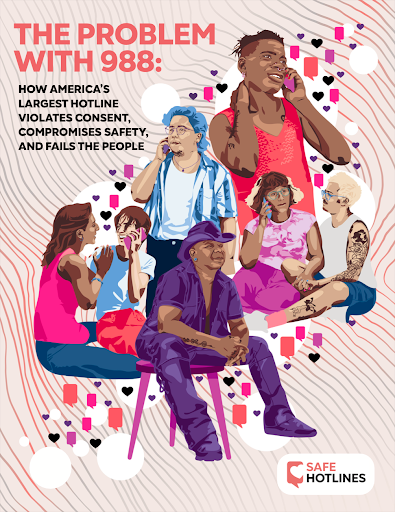Trans Lifeline Project
Overview
The study is based on survey and interview data from 210 participants. Unlike many previous studies in this arena, this study's participant pool is quite diverse. Per self-identifications, 53% of the study's participants were trans, 56% were people of color, 29% had a physical disability, and 72% had a non-physical disability or were neurodivergent.
In 2022, a group of academic and community researchers with backgrounds in social justice organizing, crisis response, surviving psychiatric hospitalization, and suicidality came together to design a mixed method study to better understand help-seekers’ experiences with crisis hotlines. We analyzed this data in teams, and used it to produce a report that outlines our findings as well as concrete recommendations for policy revisions surrounding crisis hotlines in the United States.
We were interested in this topic because of widespread community concern about the ties between crisis hotlines, police, and involuntary hospitalization. The World Health Organization and the United Nations have both explicitly condemned nonconsensual mental healthcare, but it continues to be regular practice in the US. These types of nonconsensual interventions are not only unpleasant for patients, but they also have notoriously poor outcomes and actually increase a person’s suicide risk instead of reducing it.
We feature many participant voices directly in our report in order to highlight the importance of centering help-seekers in mental healthcare reform.
Key Recommendations
- We need an end to nonconsensual interventions, including law enforcement involvement and coercive psychiatric hospitalization. We need policies that prioritize informed consent, transparency, and accountability to the needs of callers.
- We need better training and protocols for hotline operators. Instead of focusing on risk assessment in line with policies that mandate police intervention, we need operators who are trained to prioritize cultural competency, nonjudgemental support, & empathy–and policies that allow them to focus on the help-seekers instead of legal interventions.
- We need investment in non-punitive crisis care. Talking about anti-carceral mental healthcare is one thing, but having the financial resources to provide it is another. We need funding for more peer-led respite services, mobile crisis teams, and other consent-based resources.
- Since the rollout of 988 in 2022, the federal government has invested almost $1.5 billion into suicide prevention and crisis response. The funds are available. What we need now is policy change that allocates these funds to more just, transparent, and consent-based resources.


Partner Organizations
The Campaign Safe Hotlines & Trans Lifeline
Location
Nationwide
Faculty
Testimonial
“I worked with Trans Lifeline to create a public report on the current policies, practices, and impacts of the new 988 Suicide & Crisis Lifeline. Our report centers the voices of 210 hotline users who shared their lived experiences with our team, which consisted of graduate students and faculty across eight universities as well as over a dozen mental health advocates outside academia. Based on the insights of our research participants, we provided concrete recommendations for shifting 988’s policies and practices to increase the effectiveness of the hotline by recentering caller autonomy and advocating for an end to nonconsensual intervention. The FLI grant from CCEL was vital to the success of this project because we faced unexpected funding shortages halfway through the work. CCEL helped us ‘keep the lights on’ when we needed it most.”
Project Deliverable